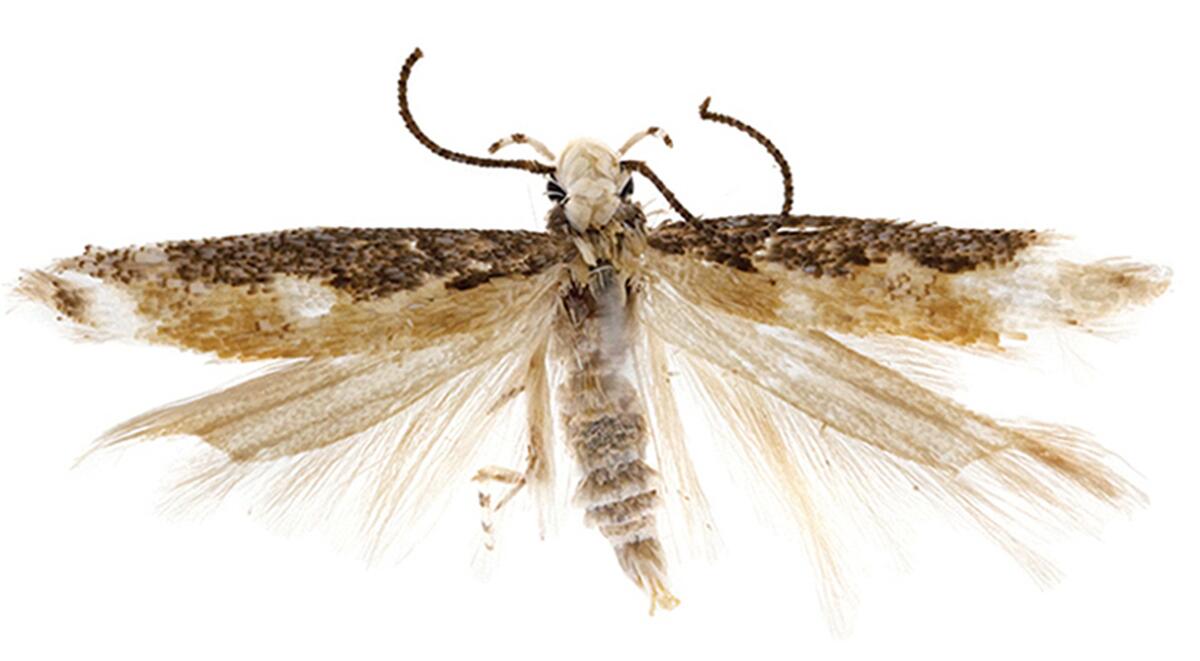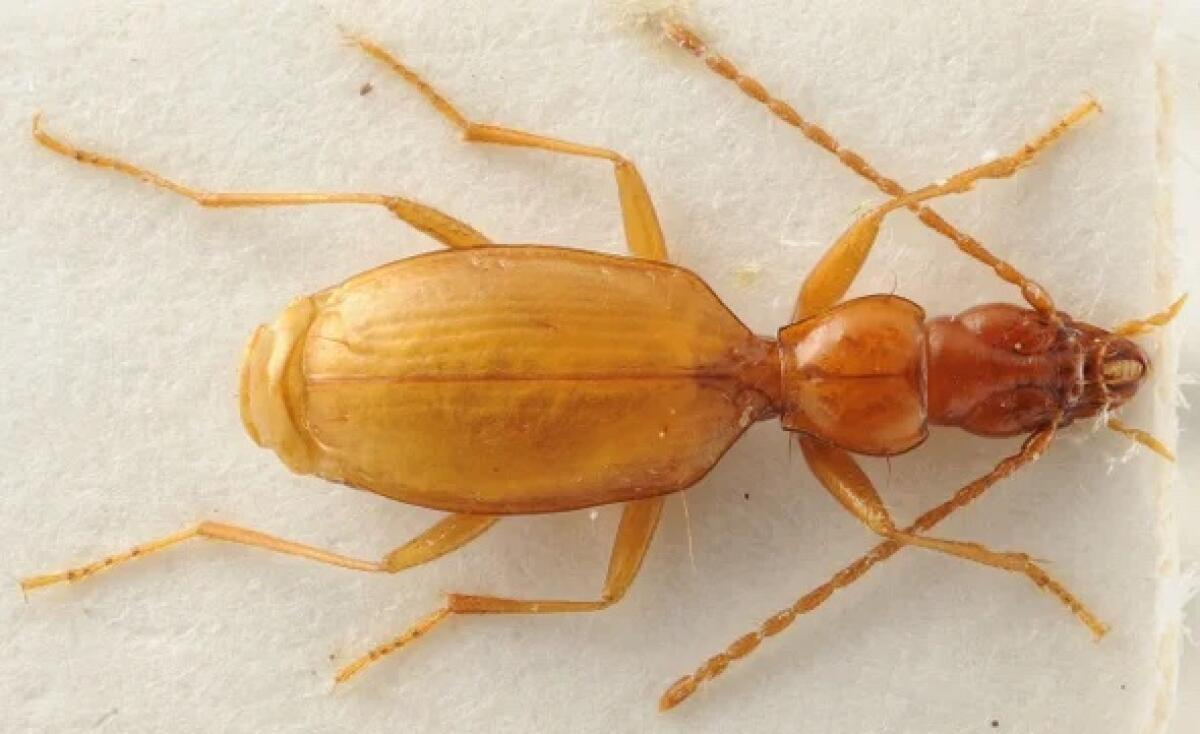The Hitler beetle, the Trump moth and the raging debate over offensive species names

- Share via
We are all familiar by now with the movement to eradicate the names of racists and other villains from the buildings, institutions and public spaces where they were once honored.
Caltech excised the name of Robert A. Millikan, its longest-serving president and a known eugenicist, from its campus; Princeton removed Woodrow Wilson’s name from its public policy school; UC removed from its San Francisco law school the name of Serranus Hastings, its original donor, because of his complicity in the California Indian genocides of the 1850s and 1860s.
Statues of Confederate soldiers and generals are being pulled down in a coast-to-coast reckoning with the Jim Crow era.
In which other spheres of human endeavor is anything still named [after] Hitler?
— Botanist Estrela Figueiredo
Although some of these changes were controversial — Millikan and Wilson were once revered figures on their respective campuses — the final decisions seemed almost preordained, once their racist and bigoted views came to be seen as outweighing their career contributions.
Now the issue has moved into a new arena: the names given to species of plants and animals. These scientific identifications are rife with celebrations of some of the nastiest exemplars of the human species.
Get the latest from Michael Hiltzik
Commentary on economics and more from a Pulitzer Prize winner.
You may occasionally receive promotional content from the Los Angeles Times.
A Slovenian cave beetle was named Anophthalmus hitleri in 1933 by a German anthropologist who admired the German dictator. A butterfly found in Libya was christened Hypopta mussolinii after the Italian fascist regime invaded that country.
The scientific bodies that oversee biological nomenclature are now grappling with demands for change. Some scientists have argued that the practice of naming plants and animals after real people should cease entirely; others that the names used by the Indigenous peoples who first came into contact with the species should be restored.
And still others say that species names have become etched into natural history and should stay, regardless of the evolution in their social acceptance.
Not all these christenings are designed to be complimentary. In 2017, researchers named a moth newly discovered in California with pale yellow head scales and small genitalia Neopalpa donaldtrumpi.
The following year, a British sustainable construction company paid $25,000 at an auction for the naming rights to a blind, burrowing amphibian and endowed it with the scientific designation Dermophis donaldtrumpi. The firm’s owner said that was a reference to the then-president’s blindly burying his head in the sand over global warming.
Scientists came to see Twitter as an indispensable tool for communicating with each other and the public. As X, it’s turned into a source of scientific misinformation and lies.
Sometimes the motivation of the namers isn’t clear. That was the case with three species named by Cornell scientists after President George W. Bush, Vice President Dick Cheney and Secretary of Defense Donald Rumsfeld in 2005. The scientists swore that the namings were expressions of homage. On the other hand, all three are species of slime-mold beetle.
At least one naming has had an effect that its creator may not have anticipated. The beetle named for Hitler became such a sought-after trophy among present-day Nazis, who poached it via traps set in the Slovenian caves, that it was threatened with extinction. Preserved specimens changed hands for as much as $1,500 each; a Bavarian natural history museum had almost its entire Hitler beetle collection stolen.

The names of Hitler, Mussolini, Trump and the three government leaders are still part of the creatures’ formal taxonomies, as are those of fauna named after the colonialist Cecil Rhodes and George Hibbert, a British slaver and plantation owner who also happened to be a scientific amateur and collector.
On the face of it, the issue seems simple. “There should be a mechanism in the zoological Code...to allow for replacement names for biological species that have been named after tyrants, dictators, colonialists and slave traders,” a group of anthropologists, paleontologists and botanists wrote last month in the Zoological Journal of the Linnean Society.
The controversy has arisen in part because there are few rules governing the naming of newly-discovered species. Convention dictates that the first word is the entity’s genus; the second, often a Latin word indicating the species, must end in “i” if it’s named after a person.
But there are few consistent standards for the species name. The Cornell entomologists who christened the slime mold beetles named other new species after after their wives, Pocahontas, Darth Vader, and the locations where the creatures were first seen. But no universally accepted system exists for reconsidering names that have taken on distasteful connotations.
Botanists have been amenable to renaming species that carry the names of discredited and discreditable individuals; a vote on changes to the naming code is scheduled for a botanical congress next summer. Also at issue for the botanists are a wide variety of plants with scientific names based on an Arabic term for “infidel” that has become a racist slur so noxious that it is treated as hate speech in South Africa and referred to as the “K-word.”
The International Commission on Zoological Nomenclature, which oversees the taxonomy of animal species, has drawn a line in the sand, however. The commission has rejected the very idea of “replacing accepted scientific names because of perceived offensiveness,” its 26 commissioners wrote in the Zoological Journal in January.
Subjecting species names to cultural fashions would undermine the stability in scientific naming, the commissioners stated. “It is well outside the scope of the Commission to assess the morality of persons honored in eponyms [that is, those that incorporate persons’ names] or the potential offensiveness or inappropriateness of certain names.”
Trump blocked a study of bat viruses for political reasons. His meddling has finally been reversed, but the world lost years of potentially life-saving research.
The commission’s stand has provoked a vigorous backlash in the scientific community, played out in the pages of the Zoological Journal, which published three responses in August.
Others ridiculed the commissioners’ devotion to “stability”: “Historical reparation is not an emotional or sentimental issue,” they wrote. “It is a rational and historically based attempt to promote equality in human society.”
The controversy seems destined to continue for some time, even as some scientific bodies have taken matters into their own hands.
In 2020, the American Society of Ichthyologists and Herpetologists changed the name of its journal on fish and amphibians, known until then as Copeia. The change acknowledged the flagrantly racist views of the journal’s namesake, the 19th century paleontologist Edward Drinker Cope, who placed white males at the pinnacle of human development and listed among “inferior” groups nonwhite races, women and southern European whites.
According to the late Stephen Jay Gould, Cope agitated to ban immigration by Jews and southern Europeans, and particularly despised the Irish. The journal was renamed Ichthyology and Herpetology.
Nonscientific names for animals and plants have been easier to update to confirm with contemporary sensibilities. What was once known as the Jewfish is now the Atlantic goliath grouper. The gypsy moth was renamed the spongy moth by the Entomological Society of America last year, and the former Hottentot teal, a duck, was renamed the blue-billed teal by the American Ornithological Society.
The trend seems to be moving toward striking the old, obnoxious names from scientific rosters. “The biological sciences should not operate outside of societal norms,” wrote the authors of one of the Zoological Journal responses.
One of the critics, botanist Estrela Figueiredo of South Africa’s Nelson Mandela University: “In which other spheres of human endeavor,” she asked, “is anything still named [after] Hitler?”
More to Read
Get the latest from Michael Hiltzik
Commentary on economics and more from a Pulitzer Prize winner.
You may occasionally receive promotional content from the Los Angeles Times.











